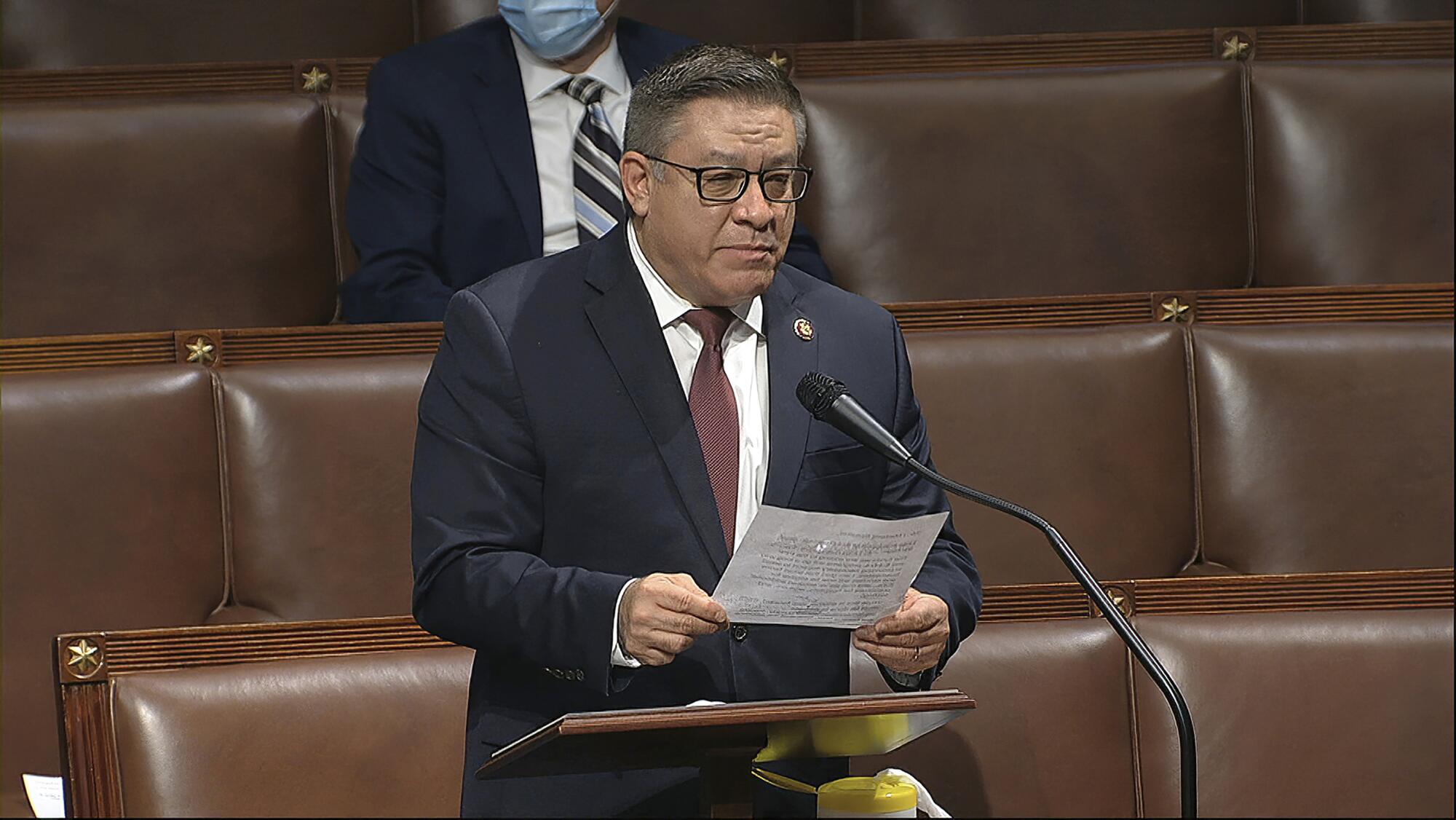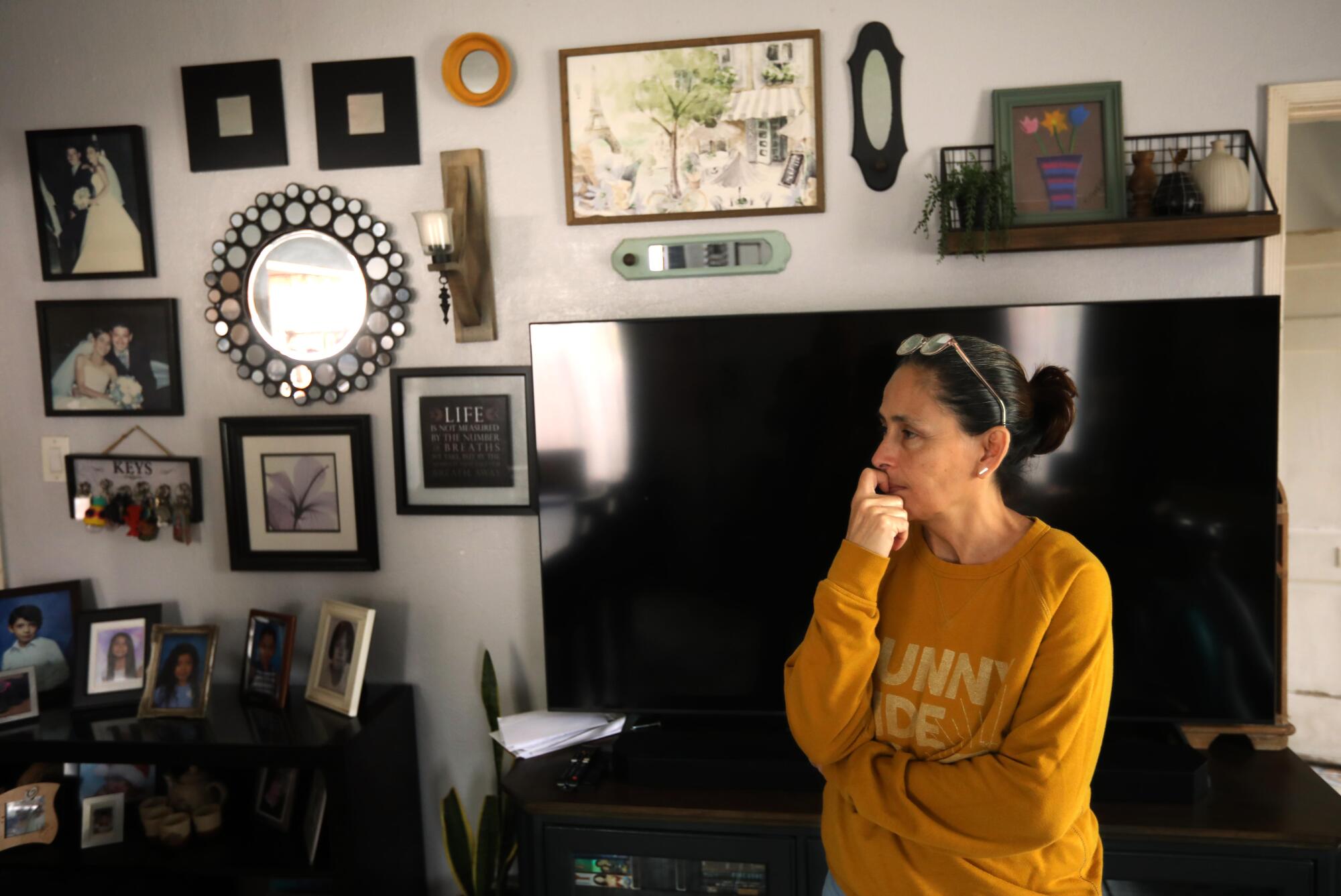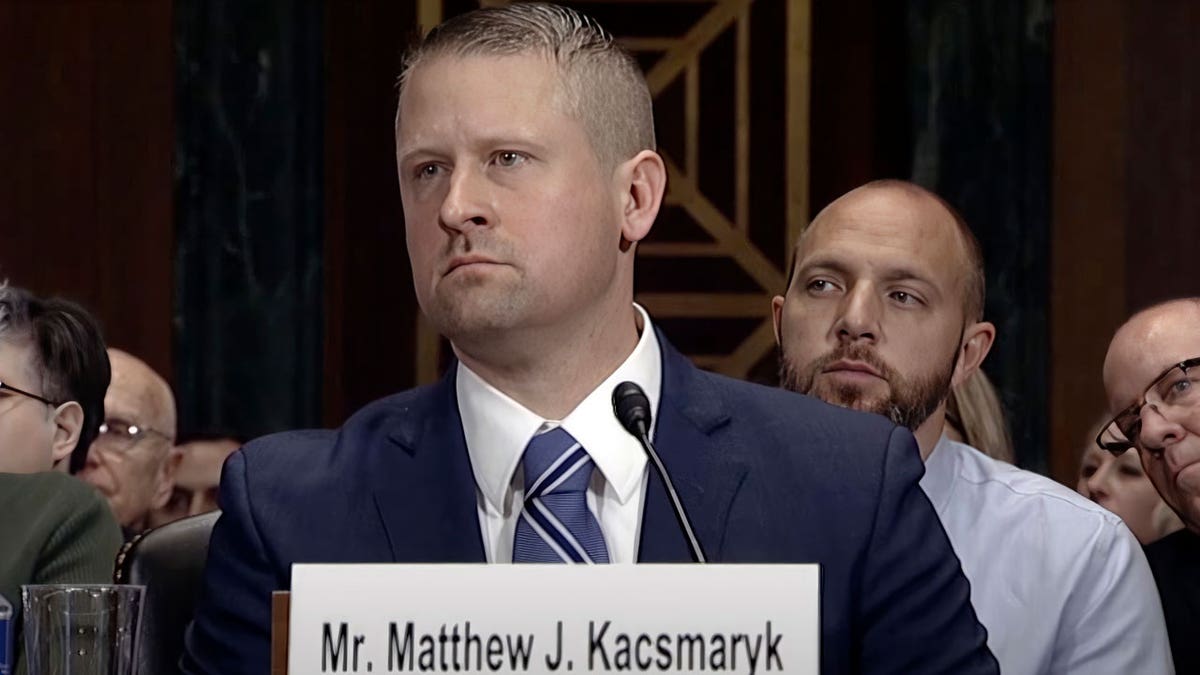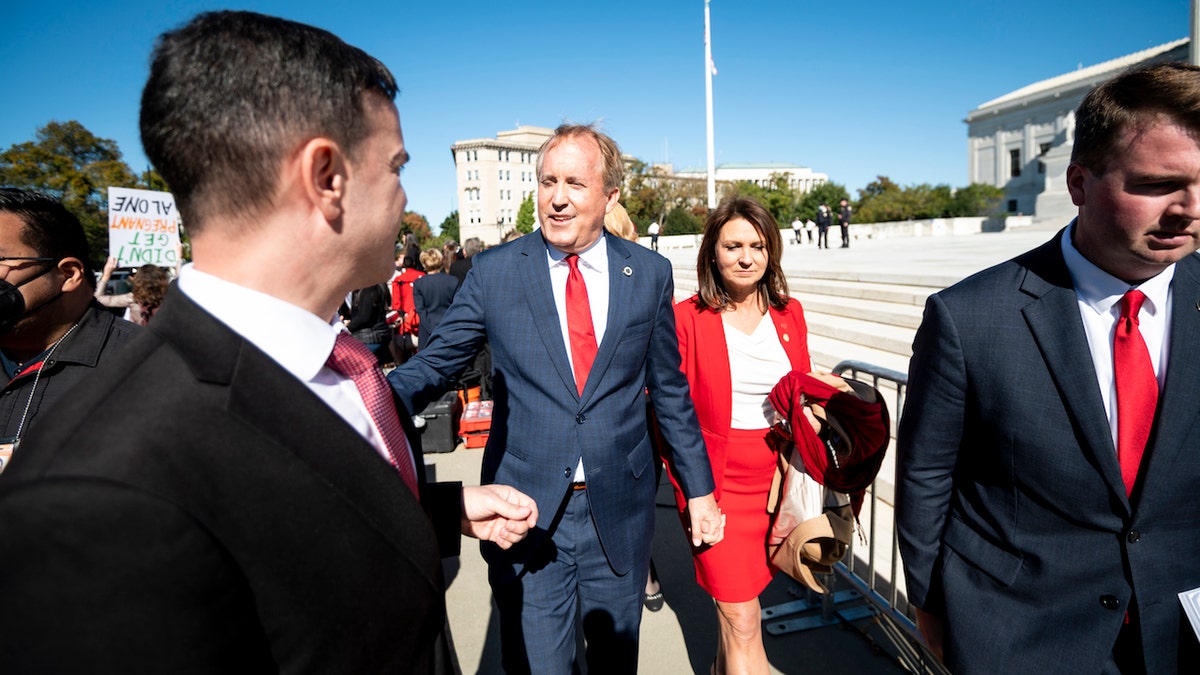Politics
Nearly 3 million Californians at risk of losing home internet service as subsidy expires

Four years ago, Claudia Aleman and her family had only one way to get online — through their cellphones. Without internet service on a computer, her youngest daughter couldn’t get homework assignments in on time, her parents couldn’t keep up with online doctor visits, and the English classes she wanted to sign up for were out of reach.
Then came a game-changer: The federal government started offering a subsidy that covered $30 of the family’s $80 monthly internet bill.
But while opening mail at her home in South Gate two months ago, Aleman came across a letter from the Federal Communications Commission announcing that the Affordable Connectivity Program they had come to rely on would end in May unless Congress approved more funding.
Claudia Aleman of South Gate said her family did not have a computer with internet service until the federal subsidy was created.
(Genaro Molina / Los Angeles Times)
“My husband is the only one who works, and everything is so expensive right now,” Aleman said. “Sometimes we don’t have $30 to spare.”
“The program made a significant difference in our lives,” she added. “Without it, life is going to be difficult, and I’m sure I’m not the only one who feels this way.”
The program, which was created after the pandemic forced many Americans to turn to the internet to connect with work and school, has 23 million enrollees nationwide — 1 in 6 U.S. households — including nearly 3 million in California.
Since 2021, it has provided a $30 monthly subsidy for low-income households and $75 for those on tribal lands. But the $14.2 billion funded through the Infrastructure Investment and Jobs Act has run out.
April was the last month of full program benefits, but households could receive a partial discount in May.
In a letter to Congress this month, FCC Chairwoman Jessica Rosenworcel warned that not funding the program would have widespread impact, especially for senior citizens, veterans, schoolchildren and residents of rural and tribal communities.
“Households across the country are now facing hard choices about what expenses they have to cut, including food and gas, to maintain their broadband access, with some households doubtful they can afford to keep their broadband service at all,” she wrote.
Internet service providers have their own programs for low-income households. People can enter their address on the FCC’s broadband map to find providers in their area. The California Public Utilities Commission also provides a list of providers with low-cost internet plans.
But finding a cheaper alternative can be difficult. Rural households sometimes have just one provider, and families who can’t afford it have little recourse.
Rep. Salud Carbajal (D-Santa Barbara) is among 228 bipartisan co-sponsors of the Affordable Connectivity Program Extension Act of 2024, which would provide an additional $7 billion to keep the program afloat for another year. Among the co-sponsors are 22 Republicans, including Rep. Young Kim (R-Anaheim Hills).
“You’ve got to have your head in the sand to not understand the value of what this is doing to enhance our economy, enhance the skills and opportunities for so many Americans,” Carbajal said. Allowing the program to expire, he said, “will undo the progress we’ve made in closing the digital divide. It would take us back to the dark ages.”

Rep. Salud Carbajal (D-Santa Barbara) has sponsored legislation to fund the internet subsidy for another year.
(House Television via AP)
But the bill hasn’t been brought for a standalone floor vote in the GOP-led House amid criticism from some Republicans who say the program subsidizes households that already had internet service. They also pointed to findings from the FCC’s internal watchdog last year that providers failed to comply with the program’s rules and improperly claimed funds.
In a statement last year, Sens. John Thune (R-S.D.) and Ted Cruz (R-Texas) said the program was “subject to massive waste, fraud, and abuse of taxpayer dollars.”
In an FCC survey of 5,300 households conducted in December, more than two-thirds of respondents said they had inconsistent or no internet before joining the federal program, the majority citing affordability. About one-third of respondents said they had both mobile and home internet service.
In October, the Biden administration sent Congress a supplemental request for $6 billion to keep the program running, but it didn’t pass.
Letting the program lapse, even if it could be restarted later, would require additional spending on outreach and re-enrollment, Carbajal said. He also worries that people who benefit from it will feel a sense of whiplash and lose trust in the federal government.
California recently dedicated $70 million in federal funding toward affordable internet service, devices and training. Carbajal said he’s glad to see his state acting, but it’s not enough.
“We can’t look at it from a parochial standpoint,” he said. “I’m not just looking out for the Central Coast and my state — I’m looking out for the entire nation.”
Still, Carbajal said he’s optimistic something will take hold before May 1. Similar circumstances have played out favorably at the last minute, he said.
In Los Angeles, the federal program has played an important role in the county’s effort to close the digital divide, which was exacerbated by the COVID-19 pandemic. Through local promotion, enrollment in Los Angeles grew to nearly 1 million households.
County officials partnered with the nonprofit EveryoneOn to get the word out. Chief Executive Norma Fernandez worries families will be confused when they see their internet bill go up and won’t understand why the program ended.
“We tried so hard and provided tons of hands-on support to get people connected and then we’re going to pull it away from them,” she said. “It’s going to cause hopelessness.”

Claudia Aleman’s family has benefited from subsidized internet service through the Affordable Connectivity Program that is running out of funds.
(Genaro Molina / Los Angeles Times)
For Aleman’s family, the pandemic changed everything. When schools first shut down, they relied on a Los Angeles County Unified School District program that offered free internet to eligible students.
But the service was unreliable — access would frequently drop or freeze up. So Aleman started leaving her daughter Miranda, now 11, with her sister and neighbors who had reliable internet access so that she could attend online classes and do her homework.
“I think my daughter lost an entire school year,” she said.
Their need for internet access at home hasn’t changed since schools reopened. Most of Miranda’s assignments are still online.
Life improved almost immediately after they enrolled in the federal subsidy program in 2022 and got internet access through AT&T. Miranda started turning in assignments on time. Aleman’s older daughters, 17 and 21, could do their schoolwork at home instead of at the library or relatives’ homes.
It also made a difference for her parents. Her father, who is diabetic, takes nutrition courses online, and her mother, who is asthmatic, needs regular video checkups with her doctor. And Aleman could finally stay in regular contact with family in Mexico.
Since learning that the program would end, Aleman said she has been applying for jobs to help her husband cover bills. In May, her husband will pay the internet bill, possibly with credit cards.
Beyond that, she said, “there’s always the library.”

Politics
Park Police union says officers ‘did everything they could’ during DC anti-Israel riot

Following the protests at Union Station by anti-Israel agitators defacing federal property in protest of Israeli Prime Minister Benjamin Netanyahu’s address to Congress, a Park Police union is pushing back against criticism that only a few arrests were made.
Thousands of Hamas-sympathizing agitators descended on Washington, D.C., Tuesday, at one point defacing federal monuments with phrases in support of the terrorist group responsible for the Oct. 7 attacks in Israel, saying, “Hamas is coming.”
Twenty-three people were arrested at the protests, but some have suggested that number should have been higher.
Sen. Marco Rubio, R-Fla., posted on X, “How many more times are they going to allow leftist degenerates who support terrorism and hate America to vandalize property and attack police? There should have been hundreds of arrests today in D.C. not just 23.”
HOUSE REPUBLICANS REPLACE AMERICAN FLAGS AT UNION STATION AFTER ANTI-ISRAEL PROTESTS
The Columbus Memorial Fountain at Union Station during an anti-Israel protest on the day Israeli Prime Minister Benjamin Netanyahu addressed a joint meeting of Congress on Capitol Hill in Washington July 24, 2024. (Reuters/Seth Herald)
But the U.S. Park Police Labor Committee is pushing back.
“Our officers on the ground did everything they could to protect life and property. In fact, despite having only 29 officers available to mitigate damage — 29! — with no additional help from the Department of the Interior, we processed several arrests for charges ranging from assault on a police officer to destruction of government property,” Kenneth Spencer, chairman of the United States Park Police Fraternal Order of Police, said in a statement.
“That’s why it’s so disheartening to hear some members of Congress and members of the media, many of whom describe themselves as ‘champions’ of law enforcement, suggesting that officers gave protesters a ‘pass’ or that insufficient arrests were made.
“Nothing could be further from the truth. Anyone who truly cares to understand the problem would see that our officer staffing crisis is at the root of our agency’s mission readiness. A small unit of 29 officers arrested 10 individuals while being assaulted by a mob of thousands. We simply did not have the staffing or resources to accomplish a mass arrest operation.”
SEE IT: THE MOST DRAMATIC PHOTOS FROM WEDNESDAY’S PRO-HAMAS WASHINGTON, D.C. PROTESTS

An anti-Israel demonstrator sprays graffiti on the Christopher Columbus Memorial Fountain at Union Station on the day of Israeli Prime Minister Benjamin Netanyahu’s address to a joint meeting of Congress on Capitol Hill in Washington July 24, 2024. (Reuters/Nathan Howard)
At least one demonstrator, whose face was covered, was spotted by Fox News carrying what appeared to be the flag of the terrorist group Hamas while others were heard shouting “Allahu Akbar.”
KAMALA HARRIS REACTS TO ANTI-ISRAEL RIOTS AT DC’S UNION STATION

Anti-Israel demonstrators burn an effigy depicting Israeli Prime Minister Benjamin Netanyahu outside Union Station on the day of Netanyahu’s address to a joint meeting of Congress on Capitol Hill in Washington July 24, 2024. (Reuters/Nathan Howard)
The White House condemned the protests Wednesday evening, calling the chaos “disgraceful.”
“Identifying with evil terrorist organizations like Hamas, burning the American flag or forcibly removing the American flag and replacing it with another is disgraceful,” White House spokesperson Andrew Bates said in a comment to Fox News Digital Wednesday evening.
Politics
Ali: Kamala Harris has a campaign soundtrack: Beyoncé's 'Freedom'

Vice President Kamala Harris’ bid for the presidency has a soundtrack: Beyoncé’s “Freedom.”
The leading Democratic presidential candidate took the stage in her first visit to her Wilmington, Del. campaign headquarters and again during her first campaign rally in Wisconsin as the song played.
Now the cathartic anthem graces Harris’ first campaign ad, in which she says: “There are some people who think that we should be a country of chaos, of fear, of hate. But us? We choose something different: We choose freedom.”
Pit that against the musical number her competitor chose for his grand entrance on Night 3 of the Republican National Conference. Donald Trump walked out to James Brown’s “It’s a Man’s, Man’s, Man’s World,” a tone-deaf choice for a former president found liable for sexual abuse, who’s bragged about sexually assaulting women, a married man who paid hush money to a porn star and a former president who rolled back women’s reproductive rights 50 years with the repeal of Roe vs. Wade.
Maybe the Godfather of Soul would have endorsed Trump’s usage of his song, but Brown would be breaking with decades’ worth of musicians who’ve decried GOP candidates playing their tracks at rallies and booster events. Adele, Rihanna, R.E.M., the Rolling Stones, Prince, Neil Young, Guns N’ Roses and Queen are among the many artists who’ve spoken out against Trump using their tunes for campaign purposes.
Heart bristled when the McCain-Palin campaign used “Barracuda.” Tom Petty insisted George W. Bush back away from “I Won’t Back Down.” Bruce Springsteen decried Ronald Reagan’s appropriation of “Born in the U.S.A.”
Beyoncé, however, gave Harris her blessing to use “Freedom,” a single from her 2016 blockbuster album “Lemonade.” The song, which features guest rapper Kendrick Lamar, is an explosive expression of empowerment. At the time of its release, it spoke to public outcry around police killings of unarmed Black men and women — Eric Garner, Tamar Rice, Freddie Gray — and protests that were largely fueled by the ire of younger generations.
Whether Beyoncé was singing about the tyranny of a cheating spouse or racial injustice (or both), the song became an anthem for a new, potentially potent block of the American electorate.
For the first time, Gen Z and millennials could now account for as many votes as baby boomers and their elders, groups that have made up a majority of the electorate for decades.
Folks under 40 have grown up with Beyoncé and her ubiquitous work. Think of Beyoncé like the Who for boomers — their work is everywhere (Republican Sen. Rand Paul played the band’s anti-war hit “Baba O’Riley” when he campaigned in 2015) — or Nirvana for Gen X, except no one cares what we think. Whatever, nevermind.
The Harris campaign’s smart choice of music coincides with a willingness to lean into a meme culture that shot up organically around the 59-year-old VP since President Biden announced Sunday that he was dropping out of the race.
Pop star Charli XCX showed her support for Harris when she tweeted “Kamala IS brat.” The British singer is referring to the TikTok and Twitter edits of Harris’ image superimposed to songs from Charli XCX’s hit album “Brat.” The avalanche of memes come from a video clip in which Harris talks about her mother’s response to the hubris of youth: “You think you just fell out of a coconut tree? You exist in the context of all in which you live and what came before you.”
Right-wing social media used the quote to deride Harris as inarticulate and a “word salad” master, but liberal swaths of Gen Z have since reworked the clip into emojis and memes that celebrate Harris’ nonconformist approach. She’s become a viral sensation, in a good way, unlike J.D. Vance’s damning “single cat lady” memes and a cringey internet joke about encounters with couches.
It’s rare that relevant talent will shill for a Republican candidate. Case in point: Trump’s pop culture ambassadors at this year’s RNC were Kid Rock, Kanye’s ex Amber Rose and former WWE wrestler Hulk Hogan, whose big moment was ripping his shirt off and screaming “Let Trump mania run wild!”
Harris chose to let freedom ring, and she has Queen Bey behind her.
Politics
Texas sues Biden administration over program giving birth control to teens without parents' knowledge

Texas officials are challenging a recent order from President Biden’s administration that would allow schools to distribute birth control to teenagers without parental consent.
Texas Attorney General Ken Paxton announced Thursday that his office is suing the Biden administration over their 2021 change to Title X guidelines banning parental consent requirements for birth control services.
“By attempting to force Texas healthcare providers to offer contraceptives to children without parental consent, the Biden Administration continues to prove they will do anything to implement their extremist agenda — even undermine the Constitution and violate the law,” Paxton said in a statement.
TRUMP SAYS HE ‘WILL NEVER ADVOCATE IMPOSING RESTRICTIONS ON BIRTH CONTROL’ OR OTHER CONTRACEPTIVES
A woman takes the next pill from a monthly pack of contraceptive pills. (Annette Riedl/picture alliance via Getty Images)
The Texas legal battle began in Dec. 2021 when US District Judge Matthew Kacsmaryk ruled that Title X — the federal program that provides free, confidential contraception to anyone regardless of age, income or immigration status — violates parental rights and violates state and federal laws.
The case was argued by former solicitor general of Texas Jonathan Mitchell, representing father Alex Deanda, who said he was “raising each of his daughters in accordance with Christian teaching on matters of sexuality, which requires unmarried children to practice abstinence and refrain from sexual intercourse until marriage.”
SCHUMER PLANS VOTE ON ‘CONSTITUTIONAL RIGHT TO CONTRACEPTION’ IN BID TO PROTECT SENATE DEMOCRAT MAJORITY

Kacsmaryk, a Trump appointee, previously ruled that parents must be informed when birth control is provided to their children under 18 years old. (Senate Judiciary Committee via AP)
In response, the federal government updated guidelines to state that Title X projects “may not require consent of parents or guardians for the provision of services to minors, nor can any Title X project staff notify a parent or guardian before or after a minor has requested and/or received Title X family planning services.”
Paxton is now seeking a permanent injunction on this rule, which he claims defies the findings of the federal court.

Paxton and his wife Angela are pictured outside the Supreme Court. (Bill Clark/CQ-Roll Call, Inc via Getty Images)
Paxton filed the lawsuit in a federal court in Amarillo. It will likely be heard by Kacsmaryk, the same judge who previously ruled parents must be informed of birth control provided to their children.
-

 World1 week ago
World1 week agoOne dead after car crashes into restaurant in Paris
-

 Midwest1 week ago
Midwest1 week agoMichigan rep posts video response to Stephen Colbert's joke about his RNC speech: 'Touché'
-

 News1 week ago
News1 week agoVideo: Young Republicans on Why Their Party Isn’t Reaching Gen Z (And What They Can Do About It)
-

 Movie Reviews1 week ago
Movie Reviews1 week agoMovie Review: A new generation drives into the storm in rousing ‘Twisters’
-

 News1 week ago
News1 week agoIn Milwaukee, Black Voters Struggle to Find a Home With Either Party
-

 Politics1 week ago
Politics1 week agoFox News Politics: The Call is Coming from Inside the House
-

 News1 week ago
News1 week agoVideo: J.D. Vance Accepts Vice-Presidential Nomination
-

 World1 week ago
World1 week agoTrump to take RNC stage for first speech since assassination attempt













